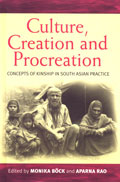
Series
Volume 3
The Anthropology of Obstetrics and Obstetricians: The Practice, Maintenance, and Reproduction of a Biomedical Profession
See Related
Anthropology JournalsEmail Newsletters
Sign up for our email newsletters to get customized updates on new Berghahn publications.
Obstetric Violence and Systemic Disparities
Can Obstetrics Be Humanized and Decolonized?
Edited by Robbie Davis-Floyd and Ashish Premkumar
376 pages, 10 illus., bibliog., index
ISBN 978-1-80073-834-8 $150.00/£115.00 / Hb / Published (June 2023)
ISBN 978-1-80073-836-2 $29.95/£23.95 / Pb / Published (June 2023)
eISBN 978-1-83695-604-4 eBook
Description
The final volume in this landmark 3-volume series The Anthropology of Obstetrics and Obstetricians: The Practice, Maintenance, and Reproduction of a Biomedical Profession looks at the challenges, and even violence, that obstetricians face across the world.
Part I of this volume addresses obstetric violence and systemic racial, ethnic, gendered, and socio-structural disparities in obstetricians’ practices in the Dominican Republic, Mexico, Peru, and the US. Part II addresses decolonizing and humanizing obstetric training and practice in the UK, Russia, Brazil, New Zealand, and the US. Part 3 presents the ethnographic challenges that the chapter authors in Volumes II and III of this series faced in finding, surveying, interviewing, and observing obstetricians in various countries.
This book is a must-read for students, social scientists, and all maternity care practitioners who seek to understand the diverse challenges that obstetricians must overcome.
An excerpt:
In our Series Overview in Volume 1, we asked the question, “Can a book create a field?” and answered that question with a resounding “Yes!” … For us, the official creation of the field of the Anthropology of Obstetrics and Obstetricians has taken not one, but the 3 volumes that constitute this Book Series.
Robbie Davis-Floyd PhD, Adjunct Professor, Dept. of Anthropology, Rice University, Houston, Fellow of the Society for Applied Anthropology, and Senior Advisor to the Council on Anthropology and Reproduction, is a well-known medical/reproductive anthropologist and international speaker and researcher in transformational models in childbirth, midwifery, obstetrics, and reproduction.
Ashish Premkumar MD is an Assistant Professor of Obstetrics and Gynecology at the Feinberg School of Medicine at Northwestern University, as well as a maternal-fetal medicine subspecialist practicing at the John H. Stroger, Jr. Hospital of Cook County, Illinois. He is also a doctoral candidate in the Department of Anthropology at The Graduate School at Northwestern University.
Subject: Medical AnthropologyGender Studies and SexualitySustainable Development Goals
Contents
Download ToC (PDF)




